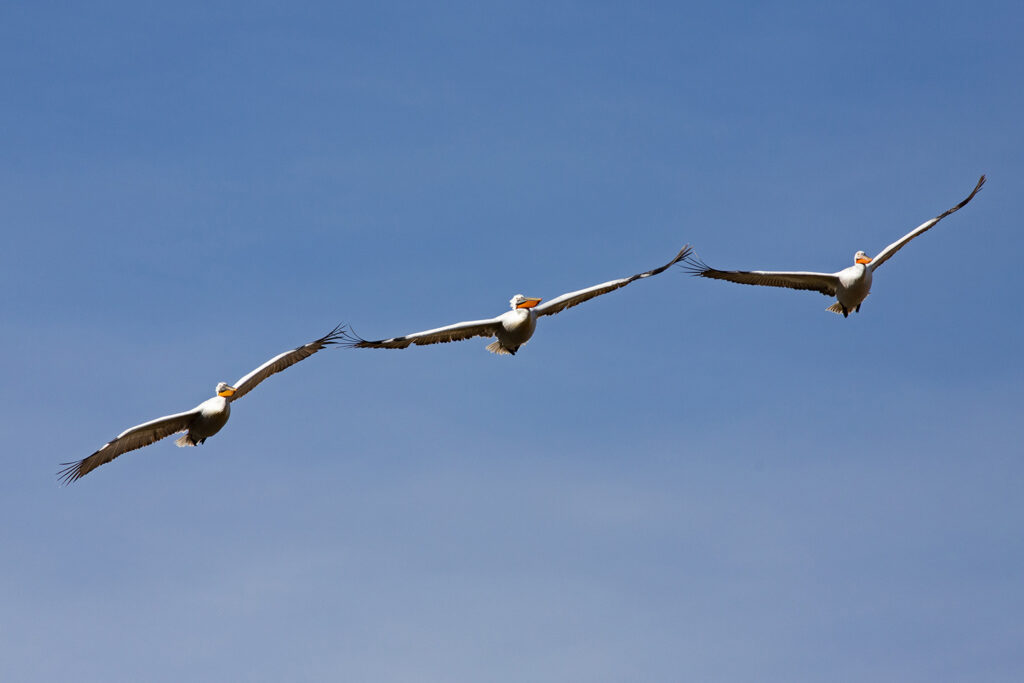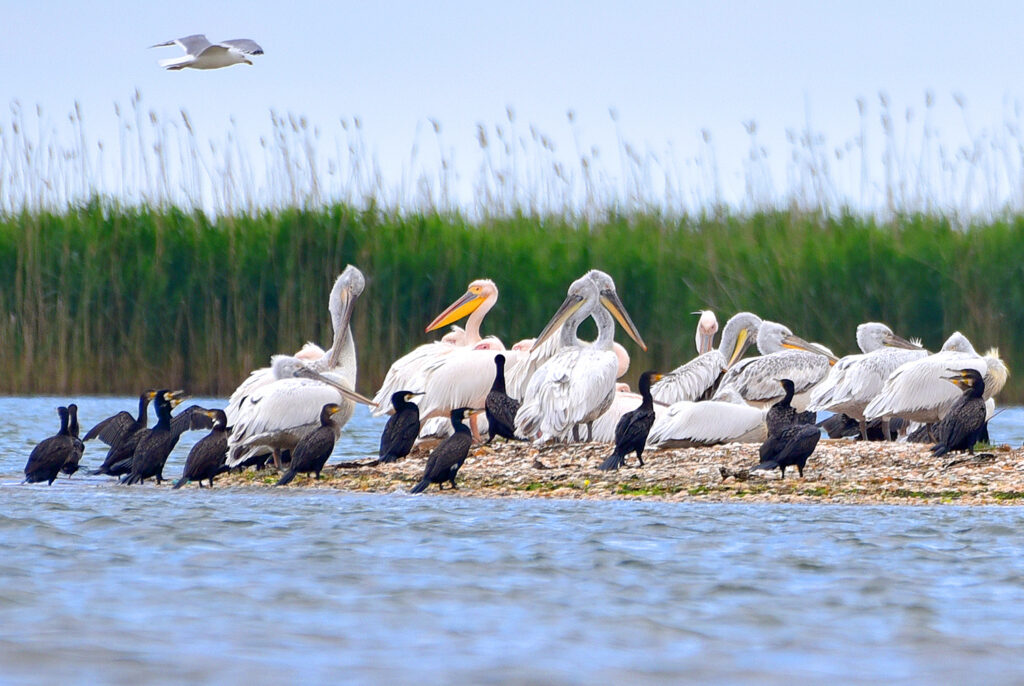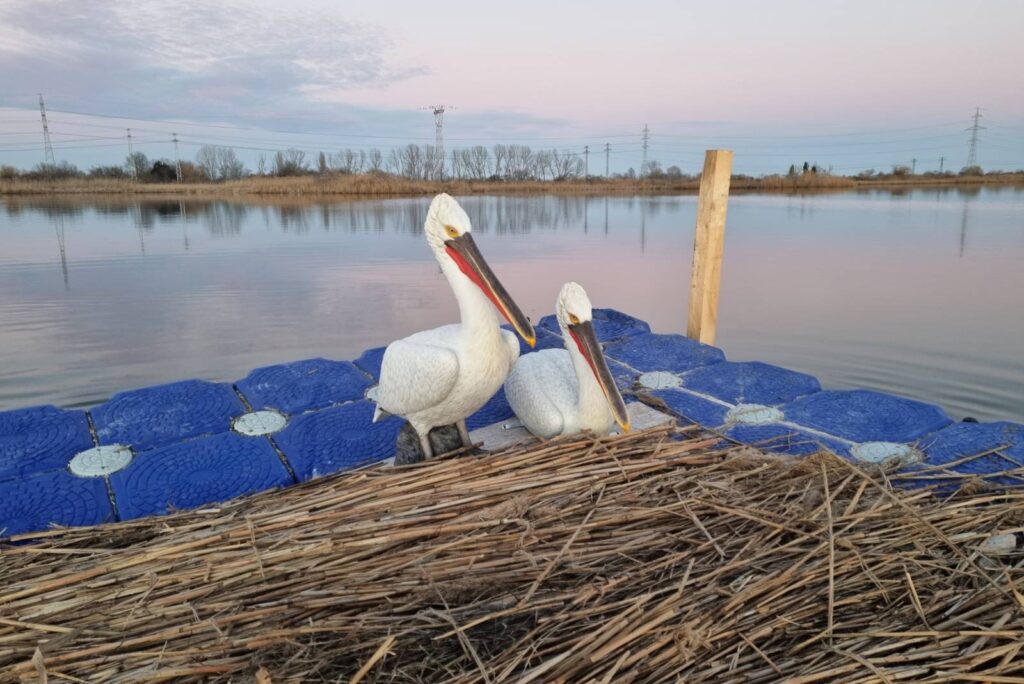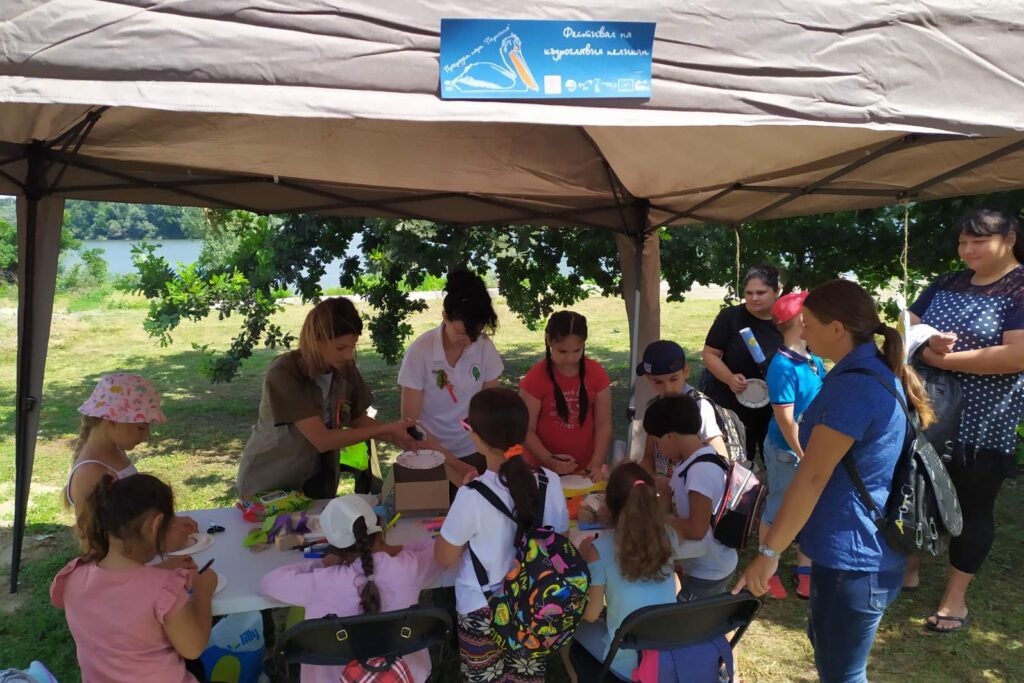A recent webinar gathered 30 participants from 11 European countries and India to learn about the Pelican Way of LIFE initiative, as work continues to improve conditions for Dalmatian pelicans along the Black Sea-Mediterranean Flyway.

Strengthening support
Coordinated by Rewilding Europe and funded by the European Commission, Pelican Way of LIFE set out to reduce threats to the birds and improve their habitat at 27 sites across Romania, Bulgaria, Greece and Ukraine. Field research, stakeholder involvement, the improvement of nesting conditions and mitigation against collisions with power lines all play their part, alongside educational activities to inspire community pride and support in the species and raise awareness and engagement. The programme is also supporting capacity building and research in Turkey, Albania, Montenegro and North Macedonia.
The Black Sea-Mediterranean Flyway is a network of interconnected populations and home to around 50% of the global population of Dalmatian pelican. The comeback of these cross-border colonies is co-financed by the Arcadia Fund – the UK-based charitable trust of Lisbet Rausing and Peter Baldwin. Partners of the initiative include the Bulgarian Society for the Protection of Birds (BSPB), the Hellenic Ornithological Society (HOS), Persina Nature Park Directorate, Rewilding Danube Delta, Rewilding Ukraine and the Romanian Ornithological Society (SOR).

A talk amongst turmoil
The 38th European Rewilding Network webinar started on a very sombre note as it took place during the morning of the Russian invasion of Ukraine. Team members of Rewilding Ukraine were on their way to safety and couldn’t participate nor present their work. Katya Kurakina, Rewilding Ukraine’s Communications Manager was replaced by Laurien Holtjer, Rewilding Europe’s Head of Communications. Deli Saavedra, Rewilding Europe’s Head of Landscapes spoke about the main objectives and actions of the initiative.
“The main actions are focused on reducing direct mortality from collisions with power lines, enhancing nesting conditions through habitat improvement action and patrols, increasing stakeholder awareness of and engagement in Dalmatian pelican conservation, and monitoring the overall impact.”

Sebastian Bugariu, Coordinator of the SOR activities in Romania presented the ongoing and planned activities and challenges the team is facing in forming a new framework for the Dalmatian pelican’s long-term survival in Europe. The team is working to fill in existing knowledge gaps to inform better decision-making and improve the species’ chances of survival. Collisions with power lines remains a problem, and the programme is investing considerable time and resources into the identification of high-risk cables and mitigation techniques, primarily using bird diverters – reflective pieces of plastic attached to the pylons.
Bolstering populations
While finding answers, it is instrumental for the Dalmatian pelican’s recovery to create new breeding colonies on the Ukrainian side of the Danube Delta to stabilise and extend the population in the region. The pelicans in the Balkans have their traditional breeding sites ranging in size from one nest, to over 250 – sitting atop of large jumbles of sticks, stones, mud, reeds, grasses and feathers; preferring sheltered spots in open or slightly concealed areas. So far, they mostly breed in small (up to 10-20 nests) and scattered colonies.

With natural nesting sites increasingly being damaged by storms or consumed by flooding, giving the pelicans an initial helping hand with nesting platforms cushioned with reeds has proven to be an effective tactic. While their natural habitat is being restored, it’s a critical first step in getting them to settle in the area, with the ultimate aim of natural nesting in the years to come without human intervention. In Ukraine, one new floating platform was installed at Kartal Lake, two new floating platforms were built in the Burgas wetlands and one was constructed at the Persina Nature Park in Bulgaria.
Gathering data
To study population status, movements, dispersal, threats and key sites, the project team is fitting a total of 25 birds with satellite transmitters across the entire flyway area. So far three birds were tagged using coloured rings and wing GPS-GSM trackers. “While tagging the pelicans remains the most challenging aspect of our work, it is a crucial action for the programme in amassing new data about locations where they congregate, feed and roost, as well as providing insights into movement patterns and causes of mortality”, said Sebastian Bugariu.

To minimise the conflicts between human communities and pelicans and decrease the disturbance of birds on the nests, Pelican way of LIFE is helping to build a sense of pride for the birds. In 2021 the first nature protection festival dedicated to the Dalmatian pelican took place, organised by the Persina Nature Park Directorate.
“Stimulating an interest in the birds is vital for their future protection, after all, you can’t protect what you don’t know or care about. Pelican Way of LIFE is working across borders with many different stakeholders to generate that sense of care. Pelicans may be ambassadors of healthy wetlands, but we need people to be ambassadors for healthy pelicans too,” said Laurien Holtjer.

Supporting Ukraine
Deli Saavedra, Rewilding Europe’s Landscape Manager together with other Rewilding Europe team members spent the rest of the day and subsequent days focusing on getting our team members and their families from Ukraine to safety.
“Some of them have moved to Romania, where we were able to find a good place for them to live and work from. The war in Ukraine is unfolding in a terrible way. We are still doing what we can to help our team and partners that are living and working in the Danube Delta region” says Deli.
However, some of them could not or did not want to leave and are still in Ukraine, and they need our help to stay safe and healthy and continue their work. You can support our partners in the Ukrainian Danube Delta rewilding landscape and the Tarutino Steppe. With your donation, we will be able to purchase and transfer medicine, equipment and any other priority items to cover the needs of staff, employees and their families in Ukraine.
The bigger picture
If you missed the webinar and would like to hear about our work to support the comeback of this wetland icon, the recording is available on Rewilding Europe’s YouTube. Stabilising and boosting fragmented Dalmatian pelican populations indirectly helps to raise the profile of wetlands, which can have a positive ripple effect through a multitude of other species.
Finding new ways to boost their numbers can reinvigorate an entire ecosystem, by highlighting the need for more formal protections of these habitats, the benefits of large-scale wetland restoration and the value of natural processes, including the need for healthy fish populations. The Dalmatian pelican’s remit is as wide as its wingspan, and if wetlands across Europe are to thrive, they will need the Dalmatian pelican to thrive too.
A platform for exchange
Today rewilding is gaining momentum as a progressive and effective approach to conservation in Europe. Underpinning this trend, the burgeoning European Rewilding Network continues to foster collaboration and amplify results.
Founded by Rewilding Europe in 2013, the aim of the ERN is to enhance the efforts of each member by facilitating the exchange of skills, insight and experience. Members meet regularly, usually via webinar, while nature-based businesses can also apply to Rewilding Europe Capital, Rewilding Europe’s enterprise loan facility.
Rewilding Europe extends a warm welcome to all European rewilding initiatives that focus on practical, result-oriented rewilding and encourages them to apply for ERN membership.